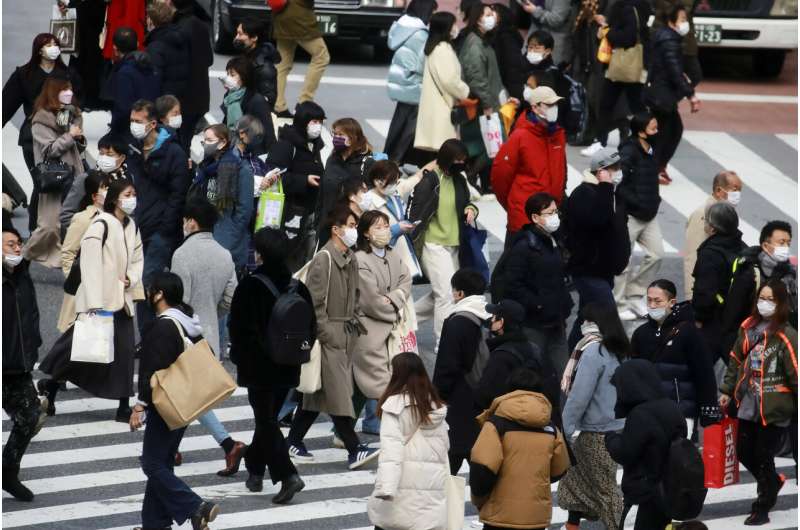
Tokyo and a dozen other areas in Japan are set to face new COVID-19 restrictions effective Friday, with local leaders shortening hours for restaurants, as omicron cases hit a record high in the capital.
A government-commissioned experts’ panel on Wednesday approved a plan to put the 13 areas under a three-week restraint through Feb. 13, said Economy Revitalization Minister Daishiro Yamagiwa, who is also in charge of virus measures.
Tokyo logged 7,377 new cases on Wednesday, its highest since a previous record of 5,908 on Aug. 13. But the soaring case numbers are not yet straining the city’s hospitals. Only about one-quarter of available beds have been filled in Tokyo and serious cases account for just 2% of all hospitalizations, according to the city government.
Prime Minister Fumio Kishida is expected to officially announce the new restrictions at a government taskforce meeting later Wednesday.
Japan has so far resisted the use of lockdowns to fight the pandemic and instead has focused on requiring restaurants and bars to close early and not serve alcohol, and asking the public to wear masks and practice social distancing, as the government seeks to minimize damage to the economy.
Japan had been gradually expanding social and business activity since an earlier wave of infections subsided in September, which experts say was largely due to the country’s rapid progress in rolling out the initial two doses of vaccines.
But experts say breakthrough infections by the omicron variant are common. The fast-spreading variant has caused a number of medical workers and others to self-isolate after testing positive or coming into close contact with someone who has. Sharply rising infections have already begun to paralyze hospitals, schools and other sectors in some areas.
The national government is taking action following requests by local governors, including Tokyo Gov. Yuriko Koike, who raised alarms about the possibility of essential public services, such as public transportation and garbage collection, grinding to a halt.
Nationwide, Japan has logged more than 32,000 cases, bringing its total to 1.93 million cases, with 184,00 deaths. More than 134,000 patients are now quarantining or hospitalized for COVID-19, according to the Health Ministry.
Shigeru Omi, the government’s top medical advisor, said vaccines no longer offer reliable protection against the omicron variant, making testing and social curbs among the only effective and realistic measures to prevent more infections.
Restrictions will be in place in 16 areas around the country, including three other prefectures—Okinawa, Hiroshima and Yamaguchi—which were placed under similar measures earlier this month.
Other areas, including badly hit Osaka, where 5,396 new cases were reported Tuesday, may be added later.
While about 80% percent of Japanese have received their first two vaccine doses, the booster rollout nationwide has been slow and reached only 1.3% of the population.
The government recently decided to cut intervals between the second and third shots to six months from eight for elderly people, but younger people are unlikely to get their turn until March or later.
While Kishida stresses the need for safety as justification for the restrictions, the measures are also seen as political moves to gain public support ahead of this summer’s parliamentary elections.
Source: Read Full Article


